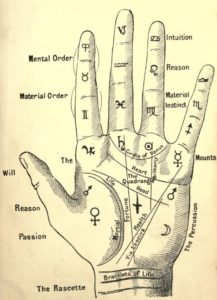 A scholar says that it is permissible to show one’s hand to palmist. ʿilm al-ghayb is only known to Allah. No one denies that. The palmist only uses the means to assess and predict a future just like the weather forecast.
A scholar says that it is permissible to show one’s hand to palmist. ʿilm al-ghayb is only known to Allah. No one denies that. The palmist only uses the means to assess and predict a future just like the weather forecast.
Moreover, it is also said that Sayiduna Idrīs ʿalayhi salām was granted the knowledge of astrology! How is it to use Astrology and palmistry in this capacity? How is it to believe in these?
Answer
Bismillāhi Taʿālā
The general principle regarding “means” (asbāb) is that they should not be regarded as the “cause”, rather considering them as a means to conclude the outcome is permissible. However, sharīʿah has excluded ʿulūm al-nujūm (astrology) from this principle. This means that sharīʿah has strictly prohibited deducing outcomes using astrology as a means (and not a cause).
It is not necessary to understand the reason behind this exception. Nonetheless, the apparent wisdom for this rule seems to be that people persist in it to such an extent that majority who revert towards astrology, tend to start believing in it. They no longer regard it as a means. Over and above that, there is no benefit in this knowledge, instead many a times one faces problems due to it.
(Since there is no conclusiveness on the wisdom of its prohibition) it can also be said that sharīʿah negates astrology being a means as well. This means that the aspects and factors which an astrologer looks at while assessing, sharīʿah classifies these factors to be fallacious. However, the generality of means is evident in the Sun and moon.
Another angle could be that astrology and farsightedness as an academic field is correct, however their principles are not established one any evidence. Hence, they are prone to much error, which many a times becomes a means of ill-wishing. Ill-wishing is a fitna and instilling negativity springs plenty a fouls. This is one of the reasons the process of identifying a thief through facial recognition is impermissible in sharīʿah.
It is mentioned that when someone wished to speak to Plato, he would ask for a picture of the seeker. Then by way of ʿilm al-firāsah (farsightedness), if he happened to be worthy of being met, a meeting would be granted. Once Plato refused to meet a person on this very basis, and the visitor said that Plato’s farsightedness is not correct. This is because, the ills which Plato has found in me, used to be there at one time, but now I have rectified myself. When a person such as Plato can be deceived by this knowledge, and become a means of ill-feelings, then the harm is clearly plausible.
In any case, sharīʿah has strictly prohibited us from these types of knowledges. It is mentioned in Ṣaḥiḥ al-Muslim, “Whoever comes to a soothsayer and asks him anything, then his ṣalāh will not be accepted for forty nights.”
Similarly, it is mentioned in a riwāyah of al-Mustadrak and Musnad al-Aḥmad, “Whoever comes to a predictor or soothsayer, and he believes in that which he says, then he has renegaded (kufr) from that which was revealed upon Muhammad”.
It is mentioned in another riwāyah of Sunan al-Arbiʿah and Musnad al-Aḥmad, “Whoever comes to a fortune teller and believes in what he says, or comes to a woman in state of ḥayḍ, or approaches her from back passage, then he is free of what was revealed upon Muhammad”
ʿAllama Ṭabrānī raḥimahullah mentions that whosoever comes upon a soothsayer and asks him of something, then a curtain is drawn between his repentance and him for forty nights, and if he believes the soothsayer, then he has committed kufr.
(قوله: والتنجيم) هو علم يعرف به الاستدلال بالتشكلات الفلكية على الحوادث السفلية. اهـ. ح. وفي مختارات النوازل لصاحب الهداية أن علم النجوم في نفسه حسن غير مذموم، إذ هو قسمان: حسابي وإنه حق، وقد نطق به الكتاب. قال الله تعالى – {الشمس والقمر بحسبان} [الرحمن: 5]- أي سيرهما بحساب. واستدلالي بسير النجوم وحركة الأفلاك على الحوادث بقضاء الله تعالى وقدره، وهو جائز كاستدلال الطبيب بالنبض من الصحة والمرض ولو لم يعتقد بقضاء الله تعالى أو ادعى الغيب بنفسه يكفر، ثم تعلم مقدار ما يعرف به مواقيت الصلاة والقبلة لا بأس به. اهـ. وأفاد أن تعلم الزائد على هذا المقدار فيه بأس بل صرح في الفصول بحرمته وهو ما مشى عليه الشارح. والظاهر أن المراد به القسم الثاني دون الأول؛ ولذا قال في الإحياء: إن علم النجوم في نفسه غير مذموم لذاته إذ هو قسمان إلخ ثم قال ولكنه مذموم في الشرع. وقال عمر: تعلموا من النجوم ما تهتدوا به في البر والبحر ثم امسكوا، وإنما زجر عنه من ثلاثة أوجه:
أحدها: أنه مضر بأكثر الخلق، فإنه إذا ألقى إليهم أن هذه الآثار تحدث عقيب سير الكواكب وقع في نفوسهم أنها المؤثرة،
وثانيها: أن أحكام النجوم تخمين محض، ولقد كان معجزة لإدريس – عليه السلام – فيما يحكى وقد اندرس.
وثالثها: أنه لا فائدة فيه، فإن ما قدر كائن والاحتراز منه غير ممكن اهـ ملخصا. (الدر المختار وحاشية ابن عابدين – دار الفكر (1/ 43))
And that which is mentioned about Sayiduna Idrīs ʿalayh salām being taught of astrology through means of waḥy, then:
Firstly: The report is not established authentically.
Secondly: The principle of astrology are established with proof, such that we say that this knowledge is exactly what has been mentioned in regards to Sayiduna Idrīs ʿalayh salām.
Thirdly: Majority of astrologers consider these stars to be cause for the outcomes, which is open shirk. (hence it cannot be attributed to Sayiduna Idrīs ʿalayh salām).
And Allah Ta’ala Knows Best,
Muftī Rashīd Aḥmad Ludhiyānwī raḥimahullāh.
Aḥsan al-Fatāwa Vol. 1 Pg. 54
صحيح مسلم (4/ 1751)
125 – (2230) حدثنا محمد بن المثنى العنزي، حدثنا يحيى يعني ابن سعيد، عن عبيد الله، عن نافع، عن صفية، عن بعض أزواج النبي صلى الله عليه وسلم عن النبي صلى الله عليه وسلم قال: «من أتى عرافا فسأله عن شيء، لم تقبل له صلاة أربعين ليلة»
المستدرك على الصحيحين للحاكم (1/ 49)
15 – أخبرنا أبو عبد الله محمد بن عبد الله الصفار، ثنا أحمد بن مهران الأصبهاني، حدثنا عبيد الله بن موسى، حدثنا عوف بن أبي جميلة، وأخبرنا عبد الله بن الحسين القاضي بمرو، حدثنا الحارث بن أبي أسامة، حدثنا روح بن عبادة، حدثنا عوف، عن خلاس، ومحمد، عن أبي هريرة، قال: قال رسول الله صلى الله عليه وسلم: «من أتى عرافا أو كاهنا فصدقه فيما يقول، فقد كفر بما أنزل على محمد صلى الله عليه وسلم» . «هذا حديث صحيح على شرطهما جميعا من حديث ابن سيرين، ولم يخرجاه، وحدث البخاري، عن إسحاق، عن روح، عن عوف، عن خلاس، ومحمد، عن أبي هريرة قصة موسى أنه آدر»
سنن أبي داود – المكتبة العصرية (4/ 15)
3904 – حدثنا موسى بن إسماعيل، حدثنا حماد، ح وحدثنا مسدد، حدثنا يحيى، عن حماد بن سلمة، عن حكيم الأثرم، عن أبي تميمة، عن أبي هريرة، أن رسول الله صلى الله عليه وسلم قال: «من أتى كاهنا» قال موسى في حديثه «فصدقه بما يقول» ثم اتفقا «أو أتى امرأة» قال مسدد: «امرأته حائضا أو أتى امرأة» قال مسدد: «امرأته في دبرها فقد برئ مما أنزل على محمد»
المعجم الكبير للطبراني (22/ 69)
169 – حدثنا علي بن عبد العزيز، ثنا سليمان بن أحمد الواسطي، ثنا يحيى بن الحجاج، ثنا عيسى بن سنان، عن أبي بكر بن بشير قال: سمعت واثلة بن الأسقع يقول: سمعت رسول الله صلى الله عليه وسلم يقول: «من أتى كاهنا فسأله عن شيء حجبت عنه التوبة أربعين ليلة، فإن صدقه بما قال كفر»